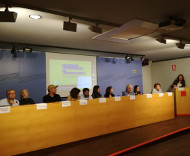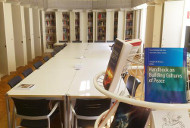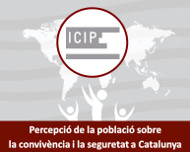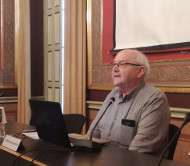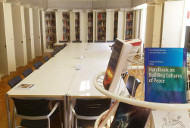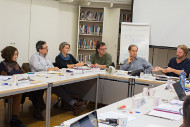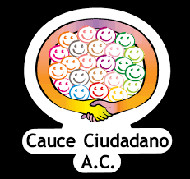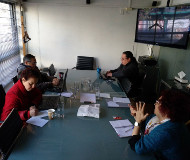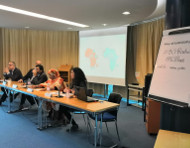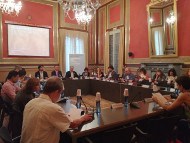The seminar Drugs, Policies and Violence: From the Global Consensus to New Approaches, organized by ICIP and Casa Amèrica Catalunya, gathered some twenty European and American experts and a hundred attendees to reflect on the various types of violence caused by drug trafficking and the war on drugs, and to analyze the risks and opportunities of market regulation.
The seminar addressed issues such as the historical perspective in drug control, new policies in the field that transcend prevailing prohibitionism, drug money and its circuit in the world economy, drug trafficking and the capture of the state, the violence caused by drug policies, and, lastly, drugs in cities. The final roundtable, in which ten of the invited speakers participated, reached the conclusion that drug policy reform is necessary in order to reduce the high level of violence currently generated by drug trafficking and its persecution, especially in countries in Latin America such as Colombia, Brazil and Mexico.
“We must move towards a legal framework that is totally different from prohibitionism because this model has failed,” says Araceli Manjón-Cabeza, a professor at Madrid’s Complutense University. Constanza Sánchez of the International Center for Ethnobotanical Education, Research & Service agrees that “reform is an opportunity for society; we need a strategic public policy aimed at reducing the damage caused by drugs.”
Analysis of the various types of violence
Many of the speakers, such as Ana Lilia Pérez and Lisa Sánchez from Mexico, Brazilian police commissioner Orlando Zaccone, and Colombian professors Rodrigo Uprimny and Luis Jorge Garay, underscored the many types of violence generated by drug trafficking and, especially, the high level of violence perpetrated by the state to repress the drug trade and criminal organizations. “For an illegal trade to set up in a country there must be violence and corruption,” says Uprimny. In Colombia, Professor Garay defines this corruption as “institutional co-option,” the infiltration of criminal organizations among state agents and public and private institutions. This is also the case in Mexico, where journalist Ana Lilia Pérez notes that the climate of corruption leads to the penetration of formal financial and business circuits, such as the oil industry, by drug cartels. “Dirty money has permeated the economy with the presence of corporate criminal groups,” says Pérez. For her part, Lisa Sánchez, director of Mexico United Against Delinquency, claims that in Mexico there is more violence perpetrated by the war against drug trafficking than by the criminal networks themselves. “The Mexican State has become fierce in its persecution of drug-related crime. Mexico has declared a war on drugs yet the ones they wage war against the least are the drug cartels.”
In fact, a shared view is that the war against drug trafficking affects the weakest actors in the network. “South America is the region of the world that has paid the highest costs in this useless fight against drugs, which has been tough on the weak and weak on the tough. The lowest echelons must be decriminalized and the highest echelons, criminalized,” says former Colombian President Ernesto Samper. “Who wins with the illegality of this business? The white-collar criminals always win,” notes Ana Lilia Pérez. In Mexico, since the beginning of the war on drugs ordered in 2006 by President Felipe Calderón, “drug trafficking organizations have gone up from 12 to 240. Sixty percent are engaged in contract killings,” said Lisa Sánchez. Meanwhile, in Brazil, where 90 percent of prisoners are in jail for trafficking in only one gram of drugs, “prisons, where four inmates die every day, are a killing machine,” denounced Brazilian commissioner Orlando Zaccone.
Overcoming prohibitionism
In this scenario of violence, most of the speakers declared to be in favor of new policies that would overcome current prohibitionism. “The regulation of drugs would imply a decrease in forceful violence in the short and medium term,” says Rodrigo Uprimny, who also warns against the risk entailed by limiting legalization to cannabis. “The worst system is what we have now, in which control is exercised by the drug traffickers,” says Araceli Manjón-Cabeza.
The results of cannabis regulatory experiences in countries such as Uruguay and Portugal were compared in the seminar. “The Cannabis Law has allowed us to more effectively pursue drug trafficking,” explains Augusto Vitale, former director of the Institute for Cannabis Control and Regulation in Uruguay. And he adds that the regulation of cannabis is based on general interest and public health concerns, and that consumption has not drastically increased.
For his part, the Assistant Director of Drug Addictions of the Generalitat, Joan Colom, defended an intermediate regulating model, a “coordinated regulation” that would allow more transparency, less stigmatization and less of a police and judicial burden.
At the other extreme, David Murray, co-director of the Substance Abuse Investigation Center of the Hudson Institute in the United States spoke in defense of the prohibitionist model. “The vagueness of decriminalization proposals is worrying. The commercial legalization of marijuana in the United States has led to astronomical effects of prevalence, which will create a catastrophic problem. Decriminalization will only make matters worse,” he said.
Author: whads
New items at the ICIP Library
The ICIP Library acquired a hundred new publications in June, most of which are available on loan. The Library, specializing in issues of peace culture, security and conflicts, and a benchmark in this field in Catalonia, is located on Carrer Tapineria 10, 1st floor, in Barcelona.
The Library supports ICIP and researchers and experts in the field of peace, and is in permanent contact with similar centers and institutions from around the world. It is part of the network of specialized libraries of the Generalitat and is included in the University Union Catalogue of Catalonia (CCUC).
In July the library opens from 9.30 a.m. to 3 p.m. from Monday to Friday. In August the centre will be closed to the public.
Catalans give the level of coexistence in Catalonia a score of 7.2 out of 10
ICIP has presented the survey “Public perception of coexistence and security in Catalonia,” based on 1,003 phone interviews, with the aim of providing representative and reliable information about the perception that Catalan society has of the aspects that shape coexistence and security and the main problems and threats related to these issues. The presentation took place at the ICIP Library with the participation of ICIP president Xavier Masllorens; Pablo Aguiar, coordinator of the ICIP program “Peace and Security in Public Policies”; and Ivan Soler, director of the Brandologia market research institute.
The results of the sample show that 70.1% of the Catalan population believes that coexistence in Catalonia is good or very good, with an average score of 7.2 on a scale of 10, and this percentage increases to 85.5% when assessing coexistence in the municipality or neighborhood, with a score of 7.8. Regarding the perception of security, 61.6% of the population believes that security in Catalonia is good or very good, with an average score of 6.7 on a scale of 10, and that percentage also increases, up to 72.4%, when security is assessed in the municipality or neighborhood, with a score of 7.2. In less urban environments both coexistence and security are assessed more positively.
The main problems of coexistence in the municipality/neighborhood are antisocial behavior, according to 45.8% of survey respondents, and cultural differences related to immigration (30.9%). These are followed by other issues, such as crime and drug-related problems (23.5%), insecurity (20.6%), and xenophobia (14.2%). In general, women perceive more coexistence problems than men, especially those related to insecurity. In all cases, however, over half the population considers that these problems are either rare or nonexistent.
The survey also focuses on the causes that can lead to discrimination in the municipality/neighborhood and concludes that 37.6% of the population perceives a lot or quite a lot of discrimination due to ideology, more than for reasons of race or ethnicity (12.7%), religion (9.2%) and sexual orientation (8.1%).
With respect to Catalonia as a whole, among the issues raised in this survey, crime and drug trafficking, along with terrorism, are seen as the main threats to security for 73% of respondents. These are followed by international political instability, (63.6%), cyberattacks (60.4%) and the pro-sovereignty process (42.8%).
Attitudes regarding coexistence and security
In a second part, the survey analyzes the attitudes that citizens have regarding different aspects related to coexistence and security by means of their degree of agreement or disagreement with a total of ten statements. The sample shows that Catalonia is a socially and politically active society, committed to coexistence and tolerance, and that it defends the right to publicly express its opinions. It is worth noting that more than half of Catalans (56.5%) have participated in two or more social or political activities in the last six months, mainly solidarity activities (61.8%), street demonstrations (53.1%) and protests with pots and pans (36.4%).
“The citizenry has been extremely active and it should be noted that the survey was conducted during months that were also extremely active politically and socially,” explained ICIP program technician Pablo Aguiar.
The statement “In a democracy everyone has the right to take part in demonstrations even though sometimes it can have negative effects on my daily routine” received an agreement score of 7.9 out of 10 (67.6% of respondents very much agree), and the statement “Creating campaigns that promote greater tolerance and respect for different opinions helps improve coexistence” obtained a 7.8 (62% of respondents very much agree). The consensus is also high, with a score of 8.2, regarding the statement “A better quality of life and less economic inequality are necessary conditions to improve coexistence” (71.1% of respondents very much agree).
On the other hand, regarding the issue of whether “the presence of symbols, such as flags in the street, worsens coexistence,” the degree of agreement is lower, with an average score of 5.3. In this case there are differences depending on the sense of belonging of the respondents: the percentage of disagreement is higher among people who feel Catalan (54.7%), while those who feel Spanish, or both Spanish and Catalan, are mostly very much in agreement (49%).
The survey also shows that there is a high degree of consensus among the Catalan people in favor of solving problems associated with coexistence and threats to security through dialogue and negotiation, as opposed to the use of coercive measures that entail the use of force.
“Catalan society largely favors resolving conflicts through mediation, and this is a very important finding,” observed ICIP president Xavier Masllorens.
The statement “I prefer to resolve conflicts through mediation rather than with the armed forces” received an agreement score of 8.9 (84.4% very much agree) and this score increases among people with a high level of education, with a score of 9.3.
The degree of agreement decreases regarding statements that refer directly to the army or the security forces. The statement “The presence of military forces represents a threat to my security” received an agreement score of 6.2, and “The presence of armed security forces in the street aggravates coexistence” received a 6. In both statements the degree of agreement is higher among people who feel mainly Catalan and are between 41 and 64 years old.
Regarding the freedom-security balance, the data show that almost half the population (45.2%) is not willing to lose any right or freedom in exchange for greater security. In this case younger people are those who are less willing to lose rights or freedom; this willingness increases with age. Differences are also perceived according to the level of education: people with a low education level are more willing to lose rights or freedom in exchange for more security.
Peace and international security
In the current political context in Catalonia, characterized by the pro-sovereignty process, the survey also focuses on what the contribution to world peace and security should be like in a hypothetically independent Catalonia. Up to 78.1% of the population believes that this contribution should mainly be in the way of conflict prevention, international mediation and civil defense policies, while only 8.5% believes that it should be mainly with an army of its own and 13.5% of respondents do not answer.
The commitment to conflict prevention and mediation policies enjoys greater support among young people between 18 and 24, people who feel mainly Catalan, with a high level of education and who are politically and socially active; in these segments support for mediation exceeds 85%. In the case of low education levels, 14.4% express a preference for the army.
According to the president of ICIP, the high consensus in favor of mediation is “a very relevant fact, which is in line with one of ICIP’s functions: to foster dialogue and the resolution of conflicts through mediation.”
Methodology used
The survey “Public perception of coexistence and security in Catalonia” is based on 1,003 interviews conducted in Catalonia between the end of April and the beginning of May 2018 and distributed throughout the land with proportional allocation, according to data of the Institute of Statistics of Catalonia, dated 1 January 2018. Thus 213 surveys were conducted in the city of Barcelona; 426 surveys were conducted in the metropolitan area of Barcelona (excluding the city of Barcelona proper); and 361, in the rest of Catalonia.
The sample has also been segmented by sex (516 women and 484 men) and by age. The level of studies, which is mostly high, was taken into account in the assessment of the results: 74.8% of respondents have completed the second stage of secondary education and 32.6% of them are university graduates. With respect to national identity, 50.8% stated that they feel only Catalan or more Catalan than Spanish, 38.3% said they feel both Spanish and Catalan, and 5.8% said they feel only Spanish or more Spanish than Catalan.
Vicent, a peacebuilder
Vicent Martínez Guzmán (La Vall d’Uixó, 1949), vicepresident and member of ICIP Board of Governors since 2016, has passed away in Barcelona on August 23 at the age of 69.
Vicent Martínez Guzmán, Doctor of Philosophy has been vicerector at Universitat Jaume I of Castellón and honorary director of the UNESCO Chair of Philosophy for Peace, as well as a member of Cristianisme y Justícia and collaborator of Escola de Cultura de Pau (Universitat Autònoma de Barcelona), among others. He is the author of numerous publications and has been a worldwide reference in the field. During his career committed to pacifism, he has worked tirelessly to resolve conflicts peacefully, being a true peacebuilder day after day.
The ICIP Board of Governors, the presidency, the management and the ICIP team mourn his loss, and we value their countless commitment to the institution. We appreciate his essential and constant contribution and we commit ourselves to follow up and spread his legacy of tenacious work and conviction with peace promotion.
The ICIP Library closes to the public in August
The ICIP Library is a center specialized in issues of peace culture, security and conflicts, and a benchmark in this field in Catalonia. It is located on Carrer Tapineria 10, 1st floor, in Barcelona.
The Library supports ICIP and researchers and experts in the field of peace, and is in permanent contact with similar centers and institutions from around the world. It is part of the network of specialized libraries of the Generalitat and is included in the University Union Catalogue of Catalonia (CCUC).
The Library will be closed to the public in August. It will reopen on the 3rd September from 9.30 to 2 pm from Monday to Friday, and from 3 pm to 6 pm on Tuesday.
ICIP hosts the first meeting to coordinate the work of Colombia’s Truth Commission in Europe
In November, ICIP hosted the first preparatory meeting for the work of Colombia’s Commission for the Clarification of the Truth in Europe, headed by Commissioner Carlos Martín Beristain, a doctor specializing in psychosocial care for victims of conflicts. The meeting took place on 9-10 November at the ICIP Library and brought together thirty participants from seven different countries. Among them were organizations of exiled victims of the conflict, academics, and representatives of European organizations that work for peace and human rights and that are knowledgeable about the conflict and the peacebuilding process in Colombia. Participating organizations included Swisspeace, ASK Working Group Switzerland-Colombia, Réseau France Colombie Solidarités, Iglesia Sueca and la Fundación Sueca para los Derechos Humanos, Kolko-Human Rights for Colombia, OIDHACO, Taula Catalana Coordinating Group for Peace and Human Rights in Colombia, International Victims Forum, Creating Memory Collective, Mujer Diáspora, Migrant and Exiled Women’s Collective, and Constituyente de Exiliados.
During the meeting, the Commissioner presented the international mandate of the Commission, which requires working with the population that had to leave the country because of the armed conflict. This is an innovative mandate, unprecedented in other truth commissions, which implies establishing a presence in at least 16 countries with the goal of documenting a thousand cases in Europe. The Commission’s mandate aims to promote the active role of victim organizations and at the same time work with non-organized victims in order to create a representative framework for the phenomenon of exile. At the same time, the Commission’s work implies guaranteeing assistance and psychosocial support for the victims, building confidence among the parties involved, recognizing diversity and incorporating a gender approach.
The organizations participating in the meeting presented the work done in relation to the Colombian peace process and the support of victims, which enabled a mapping of the current situation in various European countries. Afterwards, there was a discussion on the proposal of activities in support of the Commission. The President of the Commission, Father Francisco de Roux, also participated in the meeting via video conference.
Cauce Ciudadano, ICIP Peace in Progress Award 2018
Cauce Ciudadano is an organization founded in 2000 by young former gang members, with the goal of offering comprehensive support and opportunities to other teens that experience and/or generate violence in settings characterized by social exclusion and a strong presence of drug trafficking and criminal groups.
The organization focuses on socio-educational and socio-community work in schools, public spaces, juvenile detention facilities and penitentiaries, with the aim of training young people as agents of social change. Since its inception, the organization has assisted 230,000 people and, in a country like Mexico, characterized by the war on drugs, Cauce Ciudadano has designed a model for the prevention of violence from a human rights perspective, with an emphasis on health promotion, attention to the damage caused and rehabilitation.
The ICIP Award ceremony took place on Tuesday 12 March at the Parliament of Catalonia. The ceremony was presided over by the president of Parliament, Roger Torrent; the Minister for Foreign Action, Institutional Relations and Transparency, Alfred Bosch; and ICIP president Xavier Masllorens.
ICIP travels to Mexico as part of the new program “Violence Outside the Context of War”
ICIP has launched a new work program, “Violence outside the context of war,” focusing on physical, structural or cultural acts of violence that occur in contexts where there is no armed conflict in the most classical sense. In January, as part of this program, an ICIP team headed by director Tica Font traveled to Mexico, currently one of the countries where these types of violence are the most worrisome. The aim of this trip was to establish contact with centers, institutions, academics and other professional experts in peace, security, violence and human rights.
During this visit, ICIP held meetings with organizations such as Serapaz, Fundar, Insyde, the Mexican Commission for the Defense and Promotion of Human Rights, the National Human Rights Commission, the Protection Mechanism for Defenders and Journalists, and UNODC. The ICIP team also participated in the Colegio de México’s Violence and Peace Seminar entitled “La paz en México sí es posible” (Peace in Mexico is possible).
Annual Meeting of the Network on Business, Conflict and Human Rights in Geneva
On 29 November, more than 50 experts participated in the seventh annual conference of the International Business, Research, Conflict and Human Rights Network (BCHR Network) which took place in Geneva. The BCHR Network is coordinated by ICIP and was formally constituted three years ago.
After the welcome address by the coordinator of the conference and Network director Maria Prandi, attorney Clara Gonzales (SHERPA) presented the LaFarge Case, which led to a reflection on the legal responsibility of companies in areas of conflict. Irene Pietropaoli, Tara Van Ho, Daniel Aguirre and Rosana Alija participated in the second session, with Mark Taylor as moderator. The panel discussion focused on furthering the connection between the fields of business and human rights in processes of transitional justice, exploring the outstanding needs and challenges from different points of view.
In the third session, Gianfranco Fattorini, Erik Hagen, Haddamin Moulud Said, Marya Farah, and Omeima Abdeslam as moderator spoke about the responsibility of companies in occupied territories, especially in relation to Western Sahara, the Occupied Palestinian Territories (OPT) and Crimea.
The objective of the final session was to discuss the implementation of the UN Guiding Principles on companies and human rights in situations of conflict and post-conflict, in a consultation format led by the Intergovernmental Working Group on Business and Human Rights. In this session, Anita Ramasastry and Gérald Pachoud spurred an enriching exchange of ideas and contributions on corporate responsibility, compensation and reparations in relation to peacebuilding throughout the cycle of a conflict, in order to consolidate the project they want to present in 2020 to the United Nations Human Rights Council.
The BCHR Network General Assembly was held at the end of the conference, where Maria Prandi and Antoni Pigrau, director of the “Companies, conflicts and human rights” ICIP program, shared requests to join the group, the possibility of future conferences and the willingness to continue with the synergy between the United Nations Working Group and the Network.
Kristian Herbolzheimer will be the new Director of the ICIP
The ICIP Board of Governors has appointed Kristian Herbolzheimer as the new Director of the institution. The appointment was announced after an open public tender in which over 200 candidates applied for the position.
Herbolzheimer holds a degree in Agriculture Engineering (Universitat de Lleida, 1994) and a Diploma in Peace Culture (Escola de Cultura de Pau, Un¡versitat Autònoma de Barcelona, 2001), and he earned a Master’s degree in International Peacebuilding from the Kroc Institute for International Peace Studies (University of Notre Dame, 2009). He was a program director of Escola Cultura de Pau during seven years and, since 2009, he has been the Director of the Transitions to Peace Programme of Conciliation Resources, an NGO based in London which supports peace initiatives.
He is also an analyst of peace processes, with a special interest in the topics of postconflict and the role of civil society, especially the role of women. He has worked as ad advisor of peace processess in Philippines, Basque Country and Colombia. In Colombia he has been the promoter of the group Women, Peace and Security and of the Commission of Truth, Memory and Reconciliation of Colombian Women on Diaspora. He has long been active in Catalan grassroots environmental and development organisations, and he has a good knowledge of several languages other than English: Catalan, Spanish, Swedish, German, French.
Herbolzheimer has been elected as the Director of ICIP for the next five years. He will replace Tica Font, who left the ICIP direction last April.
ICIP visits swisspeace to exchange experiences
An ICIP delegation, consisting of ICIP president Xavier Masllorens, director Tica Font and program technician Maria Fanlo, has traveled to Bern (Switzerland) to meet with leaders of the peace research center swisspeace. The purpose of the visit is to obtain first-hand knowledge about how the center is run, exchange experiences and explore possible avenues for collaboration in the future. In 2017, the Institute established similar contacts with two international peace centers to promote the internationalization process: SIPRI, based in Sweden, and the Flemish Peace Institute, based in Belgium.
swisspeace is currently working on two issues that are of interest to ICIP, according to the new ICIP Work Objectives for 2022 approved by the Board of Governors: Dealing with the Past and Business & Peace. ICIP is working on these issues in the respective action programs Peacebuilding and the development of coexistence after periods of violence and Business, conflicts and human rights.
How to tackle violence outside of armed conflict settings
On Thursday 13 September, ICIP held the seminar “How to tackle violence outside of armed conflict settings” at the Palau Centelles in Barcelona. The seminar brought together experts in the violence affecting various countries in Latin America, a region where 40% of the homicides registered worldwide occur. This violence is linked to common problems such as organized crime, drug trafficking, gangs, corruption, inequality and poverty.
After ICIP president Xavier Masllorens’ welcoming remarks, the initial reflection was given by Ivan Briscoe, director of the Latin American and Caribbean program of the International Crisis Group. In his comments he established connections between the political violence and the criminal violence affecting the region, which “are not isolated phenomena,” and he reflected on the new types of extremely cruel and selective violence aimed at political and social leaders, which states need to know how to tackle.
The following speeches were given by Jessica Cohen, an international security analyst, Katherine Aguirre (Igarapé Institute of Brazil), Raquel Willadino (Observatório de Favelas of Brazil), Carles Feixa (Pompeu Fabra University), David Bondia (Human Rights Institute of Catalonia), Marc Bosch (Doctors Without Borders), and Gisela Cardús (Catalan Refugee Aid Commission).
The different speakers highlighted the need to address the structural causes of violence (such as inequalities, social exclusion and a lack of opportunities); the need to establish more coordination at the local, national and regional levels; to study the violence from a multidisciplinary approach; and to search for individual responses for each type of violence based on strategies of prevention and conflict transformation which go beyond current militarization policies. As a matter of fact, regarding positive strategies, a special mention was made of the cases of cities such as Ciudad Juárez (Mexico), San Pedro Sula (Honduras) and Medellín (Colombia), which for years registered the highest rates of violence and which have undergone a progressive reduction in the number of violent deaths. A reflection was also made regarding the need to respond to violence within a framework of respect for and compliance with human rights. The conference also addressed direct consequences of violence, such as population displacement and demands for asylum or humanitarian action.
Oscar Mateos, the director of the ICIP program “Violence outside of armed conflict settings,” mentioned as final conclusions the need to study strategies for the prevention of violence and for social transformation in order to be able to offer life projects in very precarious contexts, and to build emancipating and liberating peace models, which prevent violence from becoming a routine phenomenon, as an alternative to securitized peace models. He warned of the inability of states to respond to this violence and of the need to place value on sub-state actors and the creative and hopeful power of civil society.
During the seminar, a minute of silence was observed in memory of Vicent Martínez Guzmán, former vice president of ICIP, and Anna Bastida, a former member of the ICIP Governing Board. With their academic and personal expertise, these two people worked notably in the field of peacebuilding and the promotion of peace.

